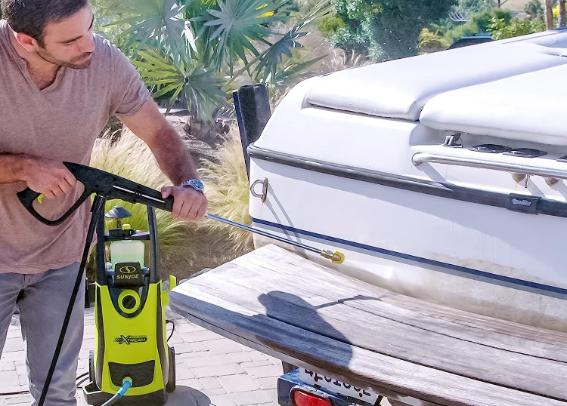
Pressure washers, like other power tool categories examined by multiple institutes, have experienced a lot of innovation in recent years, including more lasting motors, better safety features, and improved performance of battery-powered models. Our specialists spent many hours considering these and other aspects for this newest round of testing, resulting in the following list of the best pressure washers available today.
10 Best Pressure Washer Reviews of 2023| Electric And Gas
1. Ryobi 2,300 PSI Electric Pressure Washer
Best Electric Power Washer
PROS
- Impressive versatility
- Turbo nozzle for challenging tasks
CONS
- Reasonably heavy for an electric model
Our experts and everyone who gets their hands on it love this top pick. The best seller for an electric machine has an astounding pounds per square inch (PSI) of pressure (2,300! ), making it a perfect alternative for household customers who wish to be able to tackle a variety of chores. It’s a lot of machines, but the large wheels and cushioned grip make it easy to handle; it’s also relatively quiet despite being one of the most potent pressure washers from our latest round of testing.
With its outstanding 2,300 PSI, the Ryobi punches above its weight, producing a solid 1.2 gallons per minute (GPM). When power-washing large areas, the vast onboard detergent tank comes in handy. We particularly enjoy the extra turbo nozzle, which promises up to 5% more cleaning power for demanding situations like oil-stained driveways or heavily mildewed fencing.
Type: Electric
Maximum pressure: 2,300 PSI
Flow rate:1.2 GPM
Hose length:25 ft.
Weight:49 lbs.
Detergent tank: Yes
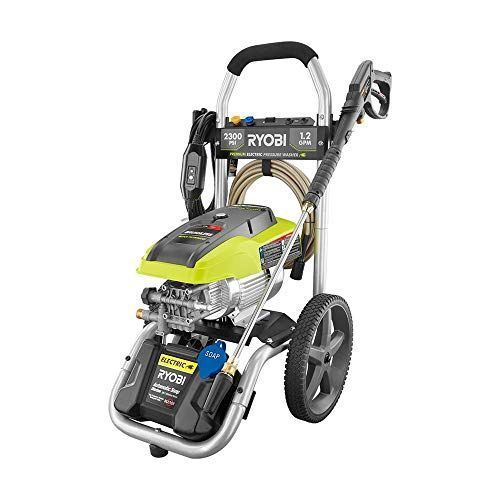
2. Simpson MegaShot
Best Gas Pressure Washer
PROS
- Extremely powerful
- Durable construction
CONS
- Heavy to transport
- Pricey
The Simpson MegaShot is our list’s most costly pressure washer, but its remarkable power justifies the cost. The device contains five quick-connect spray tips, a maximum PSI of 3,200, and a flow rate of 2.5 GPM, which is more in line with professional-grade equipment.
It’s more than the ordinary homeowner will require, but it’s an excellent choice for any DIYer who values performance and strength above all else. Remember that at 65 pounds, it’s not as light as other versions.
Type: Gas
Maximum pressure:3,200 PSI
Flow rate:2.5 GPM
Hose length:25 ft.
Weight:65 lbs.
Detergent tank: No
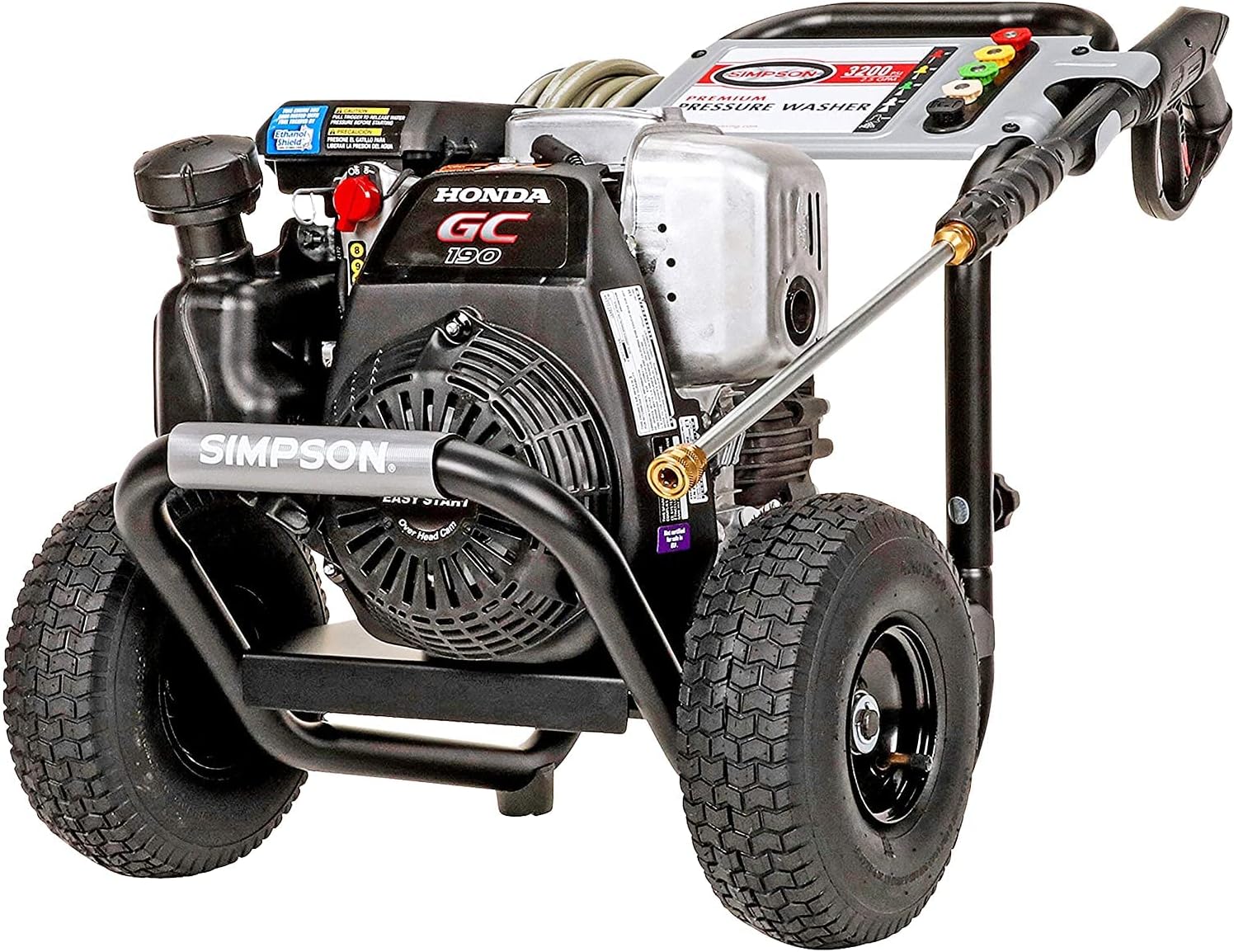
3. Sun Joe 2,030 Max
PROS
- Well priced
- Lightweight and portable
CONS
- The 20-foot hose is on the shorter side
This Sun Joe electric pressure washer is an excellent budget-friendly selection if you’re searching for inexpensive equipment to get the job done. With a weight of 27.6 pounds, it’s one of the lightest versions we tested. The highly rated device (54,000 Amazon ratings and counting) has a maximum flow rate of 1.76 GPM and delivers 2,030 PSI.
We liked that the twin detergent tanks could hold distinct cleaning chemicals during our tests. You might not want to use the same cleaner on your car as you use for the deck, so it’s nice to be able to switch between the two. Meanwhile, the five quick-connect spray tips provide versatility, allowing you to clean everything from decks and siding to cars and boats.
Type: Electric
Maximum pressure:2,030 PSI
Flow rate:1.76 GPM
Hose length:20 ft.
Weight:31 lbs.
Detergent tank: Yes (dual)
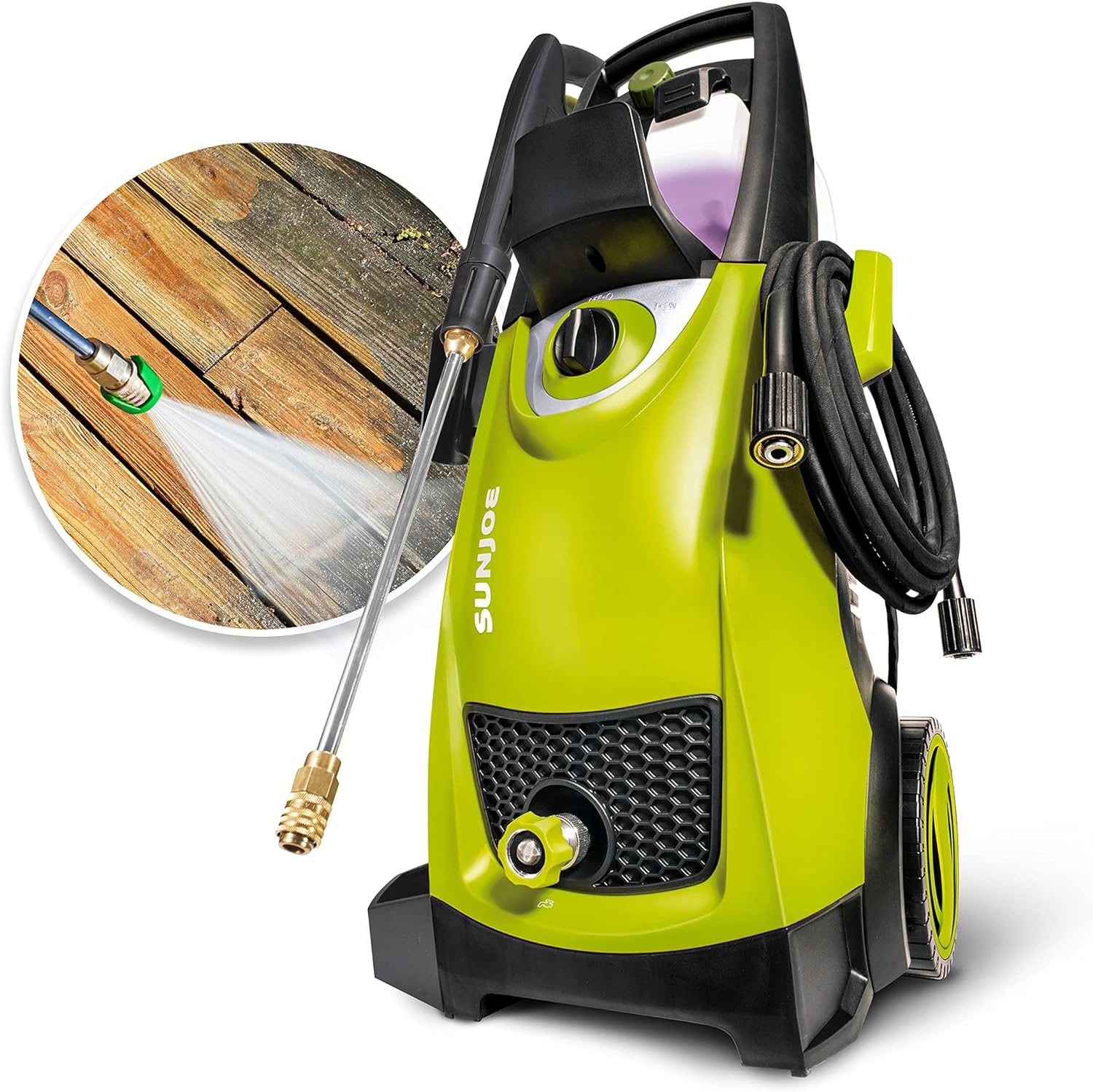
4. Ryobi 1,900 PSI Electric Pressure Washer
Best Value Pressure Washer
PROS
- Excellent price
- Easy handling
CONS
- Not up to heavy-duty tasks
Ryobi’s electric pressure washer provides a good balance of value and performance. With a low 1,900 PSI and 1.2 GPM, the machine is best suited for little tasks such as removing dirt and mildew from your deck. The lightweight 22.7-pound structure and telescoping handle make for easy handling.
We also enjoyed the small design and vertical storage during our testing. It’s helpful if you have little space in your shed or garage.
Type: Electric
Maximum pressure:1,900 PSI
Flow rate:1.2 GPM
Hose length:35 ft.
Weight:21 lbs.
Detergent tank: Yes
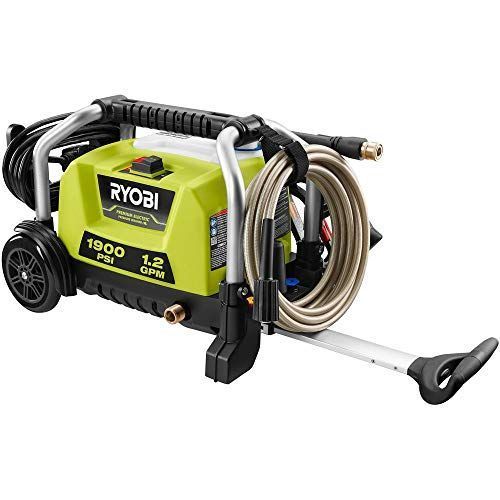
5. Sun Joe SPX3000-XT1 XTREAM
Best Pressure Washer For Cars
PROS
- Loaded with accessories
- Versatile cleaning power
- Easy handling
CONS
- Plastic housing is not quite as durable as metal
The Sun Joe XTREAM wowed our testers on all surfaces, including brick, concrete, and PVC. However, we particularly appreciate this model for customers who intend to pressure-wash their automobiles due to the abundance of accessories that make the process easier. There’s the detergent foam cannon, which, according to our tests, can spray soapy water up to 15 feet. We also put the soft-bristled brush and rim brush through their paces as they work together to clean every surface of the car’s exterior. The quick-connect nozzles with inbuilt storage make rinsing a breeze.
We used the 40-degree nozzle for the body of the car and the 25-degree one for the tires and wheels. This machine is versatile, with plenty of power for dirtier jobs on hard surfaces. The Sun Joe is one of the giant pressure washers evaluated, so it will take up more space in the basement or garage. However, the clever design, which has integrated cord and hose pockets, will aid in the retention of accessories.
Type: Electric
Maximum pressure: 2,200 PSI
Flow rate: 1.65 GPM
Hose length:20 ft.
Weight:28.4 lbs.
Detergent tank: Yes
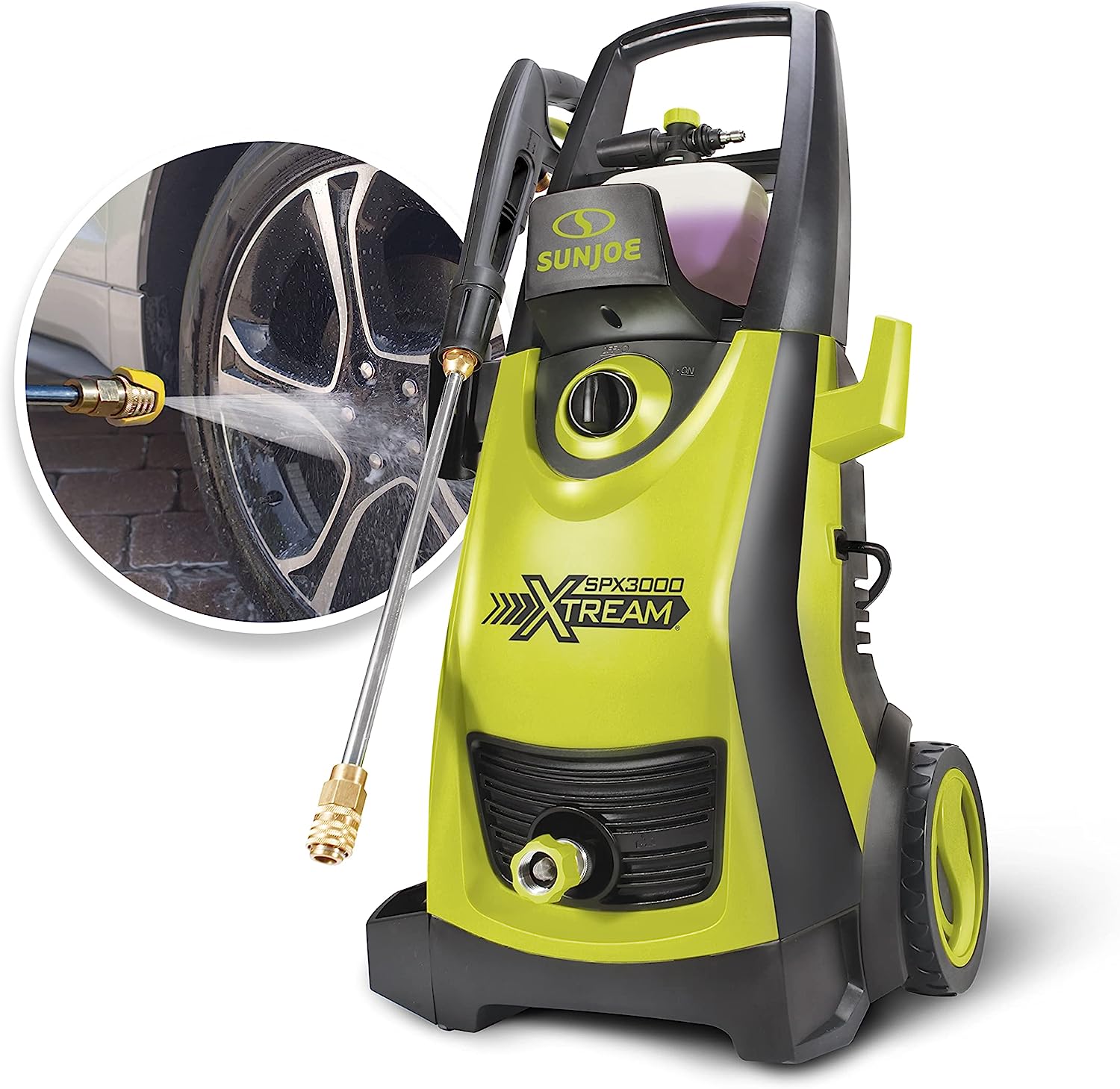
6. Greenworks Pro 3,000 PSI Electric Pressure Washer
Best Heavy-Duty Electric Pressure Washer
PROS
- Extremely effective cleaning power
- Convenient onboard tool storage
- Versatile accessories
CONS
- Pricey
- Heavy, bulky design
This is the most influential electric pressure washer we’ve ever tested, with a maximum pressure of 3,000 PSI (some gas-powered machines may reach 4,000 PSI). It’s a severe piece of power equipment, Extremely durable. It has enough power to blast through our most demanding tests, including cleaning a brick patio covered in several years of mildew and muck.
Though the Greenworks unit can handle any task, it requires more dedication than typical pressure washers. To begin with, it is somewhat pricey. Compared to five minutes or less for simpler models, it took an hour to assemble. Even with the wheeled design, transporting the 52-pound machine requires some muscle, and finding somewhere to store it may be even more difficult. If none of those drawbacks bother you, Greenworks will not disappoint you regarding cleaning power and simple, intuitive operation. Our testers were also impressed by the brushless motor’s reasonably quiet operation, especially given how powerful the pressure washer is.
Type: Electric
Maximum pressure:3,000 PSI
Flow rate: 2.0 GPM
Hose length: 25 ft.
Weight:52 lbs.
Detergent tank: Yes
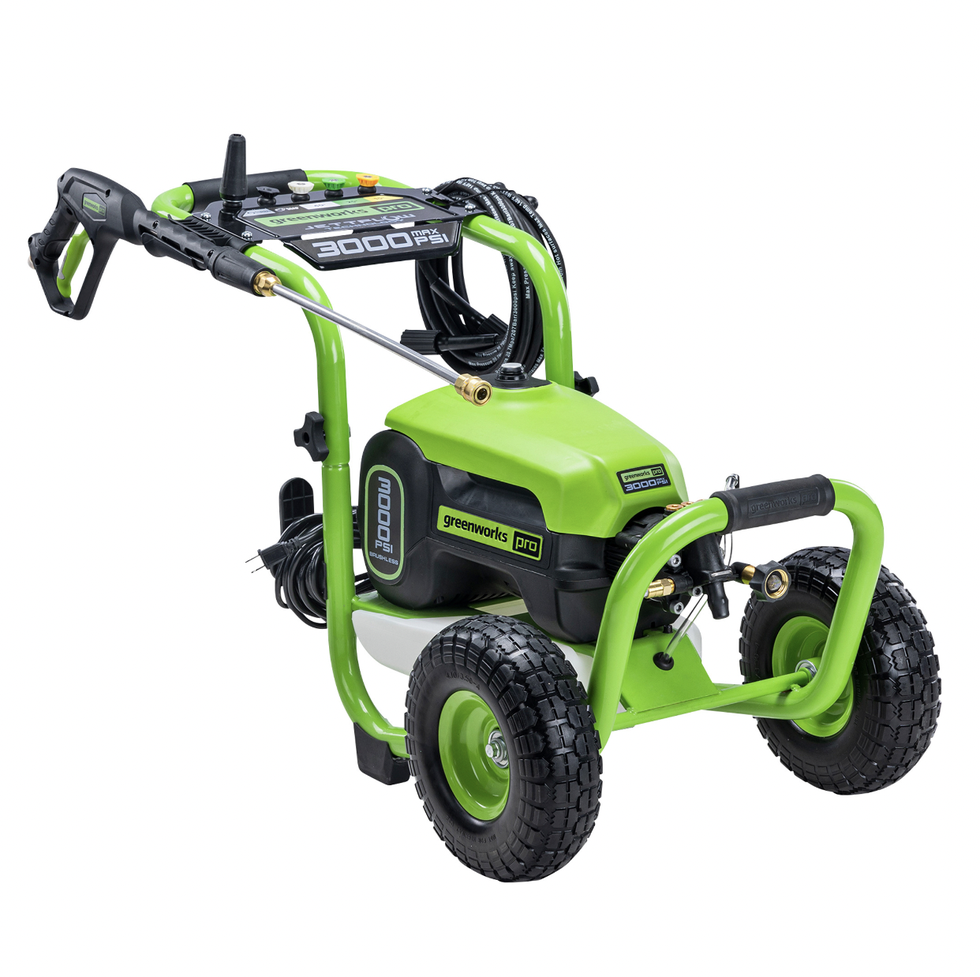
7. Worx 1,700 PSI Electric Pressure Washer
Best Portable Pressure Washer
PROS
- Lightweight, compact design
- Solid cleaning performance
CONS
- Less versatile than other top models
All pressure washers are designed to be portable, but some are far more so than others. With only 16 pounds and a small house, this reasonably priced model is the easiest of our options to transport while still providing an astounding 1,700 PSI and 1.2 GPM. It’s perfect for DIYers using a pressure washer for the first time, noting that assembly was exceedingly simple, taking less than five minutes, and the machine is also quite simple. Cleaning performance was consistent across all of our test surfaces.
Less adaptability is the trade-off for the compact design and low pricing. No soap dispenser, for example, and no additional brushes or accessories exist. Furthermore, the Worx only comes with two nozzles: a 40-degree nozzle for a wide spray and a turbo nozzle for targeted high-powered blasts. Nonetheless, our experts think it’s the best pressure washer for beginners or those who want to take the equipment to a building site or a marina to clean the boat.
Type: Electric
Maximum pressure:1,700 PSI
Flow rate:1.2 GPM
Hose length:20 ft.
Weight:16 lbs.
Detergent tank: No
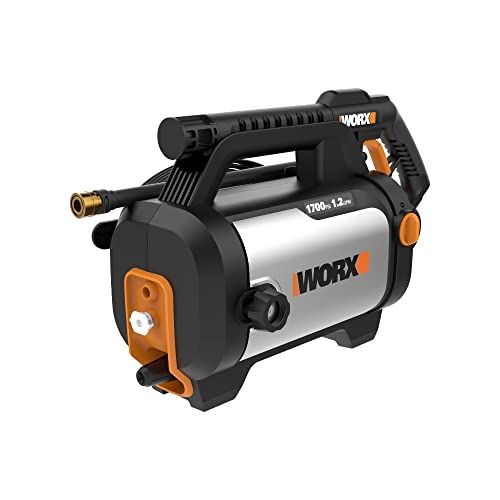
8. Generac 2,900 PSI Gas Pressure Washer
Best Heavy-Duty Gas Pressure Washer
PROS
- Serious cleaning power
- Solid ergonomic design
CONS
- Fairly hefty
- High price
Suppose you need significant cleaning power to remove oil stains from the driveway or persistent tree sap from the patio. In that case, this professional-grade and best gas pressure washer from Generac is worth considering. It has a PSI of 2,900 and a flow rate of 2.4 GPM, making it one of the most powerful devices we examined.
Weighing 50 pounds, the machine requires some muscle to move about, but we discovered that the heft is balanced out by some pleasant ergonomics, such as a padded grip and an easy-to-pull trigger, which should reduce hand cramps. It does not, however, have an onboard detergent tank.
Type: Gas
Maximum pressure: 2,900 PSI
Flow rate:2.4 GPM
Hose length:25 ft.
Weight: 50 lbs.
Detergent tank: No
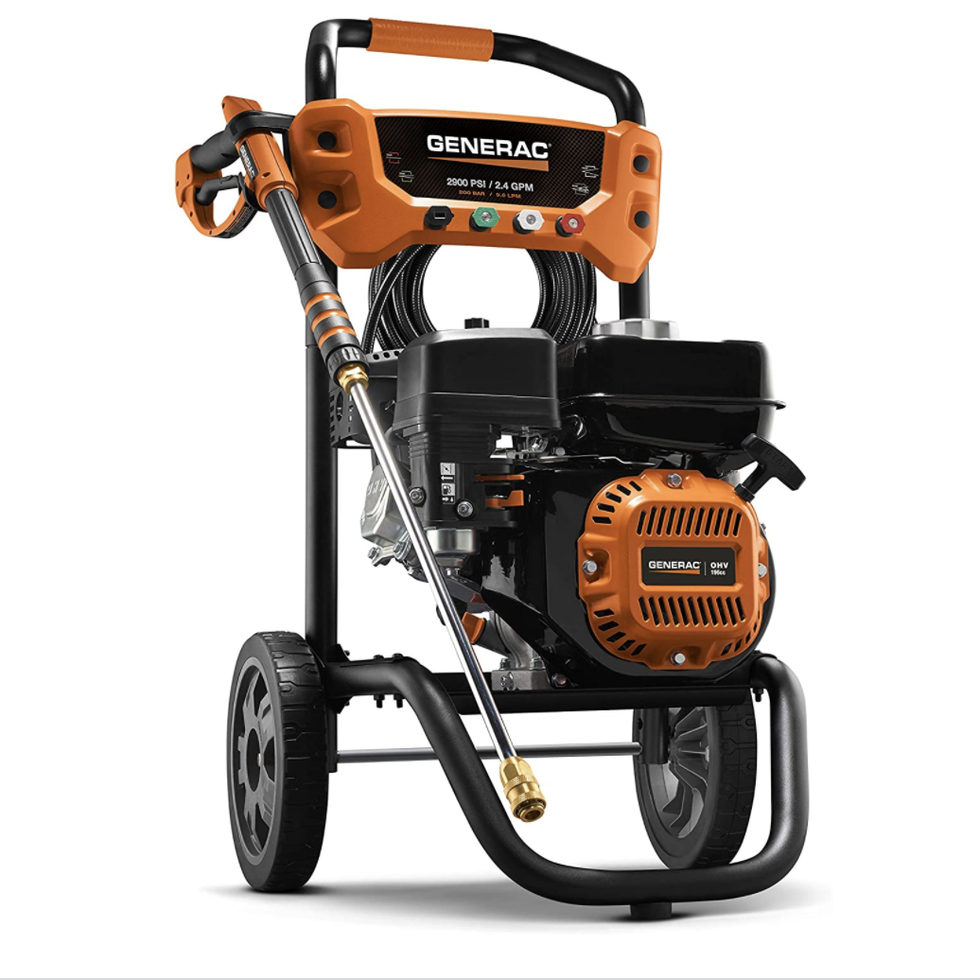
9. Karcher K4 Electric Pressure Washer
Most Versatile Pressure Washer
PROS
- Versatile sprays
- Retractable handle
CONS
- Bulky design
Even though we found this model to be a little hefty during our testing, it makes up for it with exceptional cleaning power. The 1,900 PSI, 1.5 GPM machine comes with two spray lances, one with an onboard dial for adjusting pressure without changing nozzles and another with higher power for quickly cleaning oversized patio and deck areas.
Despite its size (nearly three feet tall), the machine includes many storage-friendly features, including a retractable handle.
Type: Electric
Maximum pressure:1,900 PSI
Flow rate:1.5 GPM
Hose length:35 ft.
Weight:27.3 lbs.
Detergent tank: Yes
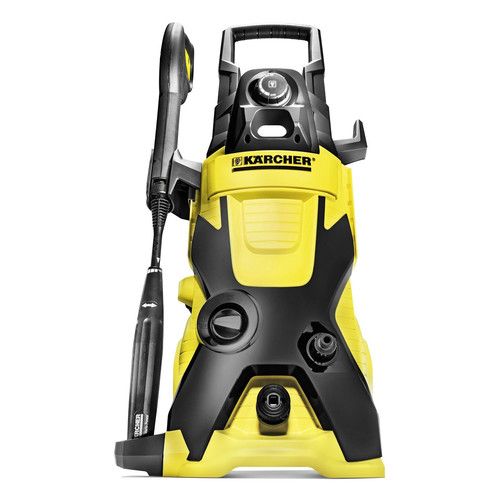
10. Craftsman V20 1,500 PSI Pressure Washer
Best Battery-Powered Pressure Washer
PROS
- Eliminates the power cord
- A suction hose can draw water from a bucket
- Onboard detergent tank
CONS
- Not as powerful as corded electric or gas models
In the best pressure washer category, battery-powered operation is a relatively discovery. Other power tools we test have run on batteries for years with impressive results; we anticipate the same for pressure washers. The Craftsman is one illustration of the options. While the early cordless pressure washers had a maximum pressure of 500 PSI, the Craftsman has a maximum pressure of 1,500 PSI, allowing it to do more challenging work like cleaning decks and fences, albeit it may struggle with the most difficult tasks, such as washing an oil-stained concrete driveway.
It’s a pleasant convenience not to have to deal with a power cord. The device goes further by having a self-priming mode and a suction pipe that allows you to draw from any freshwater source, including a pail filled with tap water. A five-gallon bucket was enough water to pressure-wash an entire SUV, running the equipment for nearly 20 minutes at low speed. The twin 20-volt batteries provide a total run time of around an hour at a low rate and about half as long at high speed. As a result, our experts recommend the Craftsman for short, light-duty cleaning jobs.
Type: Battery-powered
Maximum pressure:1,500 PSI
Flow rate:1.2 GPM
Hose length:20 ft.
Weight:20 lbs.
Detergent tank: Yes
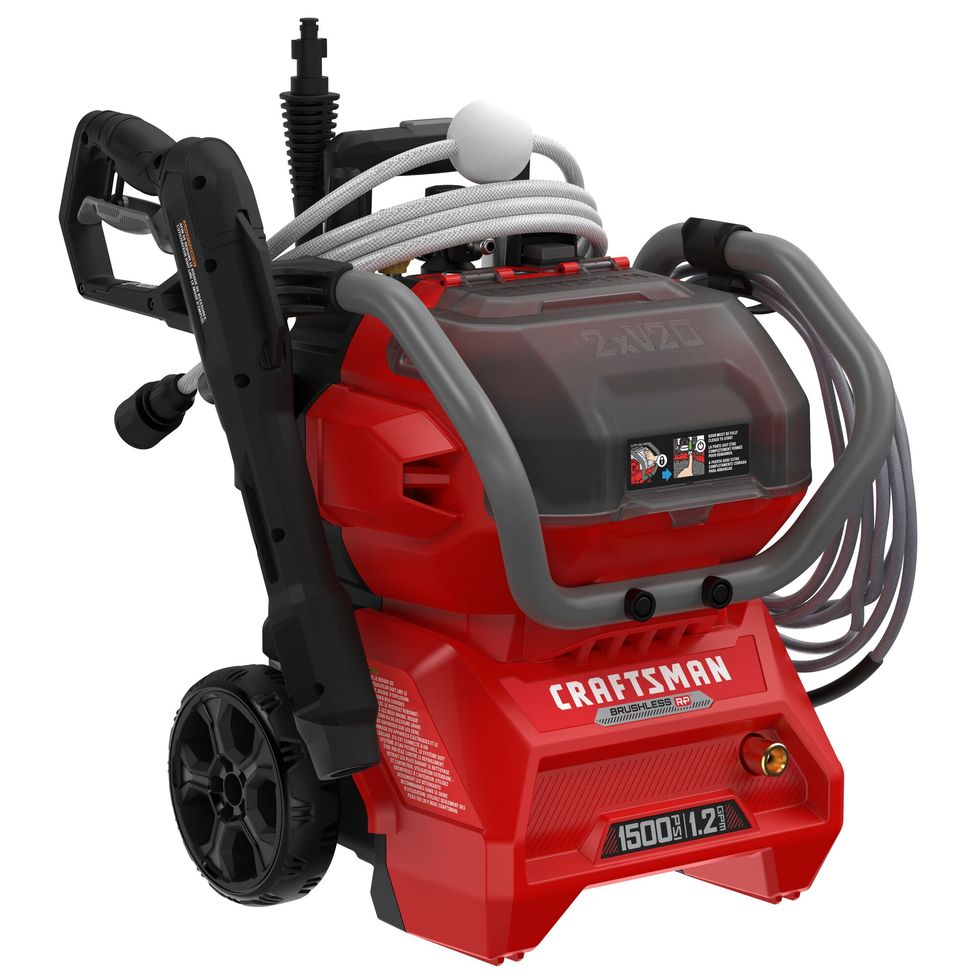
How To Select The Best Pressure Washer
Pressure Washer Safety
Before purchasing the best pressure washer, you should know that inappropriate use might result in significant harm. As a result, you should not operate the machine unless you have read the handbook and are using adequate safety equipment. Anderson states that Mi-T-M advises customers to “follow all safety instructions on decals located on the washer and always wear safety goggles and closed-toe shoes to protect yourself from the possibility of direct spray.” Keep the spray away from people and animals, regardless of protective equipment.
Before using an electric pressure washer, ensure the power cord has a functional ground fault circuit interrupter (GFCI) by pressing the “test” button. While a GFCI can assist in preventing electrocution, it is best to keep water away from electrical lines and outlets. Finally, while swapping nozzles or doing maintenance, always turn the machine off and pull the trigger a few times to remove any leftover pressure.
Pressure Washer Flow Rate And Pressure
When purchasing a pressure washer, consider the pressure rating, measured in pounds per square inch (PSI), and the water flow rate, measured in gallons per minute (GPM). In reality, you may estimate cleaning power by combining PSI and GPM to create what pressure washer manufacturers call cleaning units (CU.) While increased pressure and flow rate result in more cleaning power, Anderson claims that “in most cases, a 2,000 PSI pressure washer will be sufficient for most homeowner cleaning tasks.”
Similarly, our testing indicated that pressure washers with ratings as low as 1,500 PSI are suitable for most households; however, they may take longer to achieve the same results as more powerful equipment. As a result, most electric pressure washers may be used to clean cars, wood decks, plastic patio furniture, and pavement.
Questions You Might Ask
How long does a pressure washer last?
The longevity of a pressure washer is determined by the model purchased. Many electric pressure washers must be changed every 2-3 years; high-quality gas pressure washers can last up to 10 years.
Is dish soap suitable for pressure washers?
Most dish soaps are safe for pressure washers but must be placed correctly. You can add soaps or surfactants to most pressure washers through a device called a downstream injector; it is essential to have the downstream injector hooked up [correctly] because the pumps on pressure washers are not designed to pressurize anything but water, and soaps can damage the pump.”
What is the distinction between a power washer and a pressure washer?
Pressure and power washers are similar and excellent for rapid and easy cleaning. What’s the distinction? Pressure washers generate a pressurized stream of water, whereas power washers heat water to generate a pressurized stream of steam.






